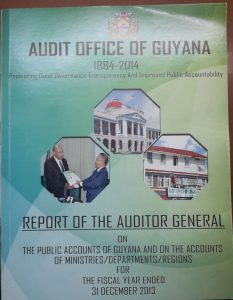Auditor-General unmasks PPP/C’s abuse of Treasury while in Office – Report shows billions held in special accounts, millions overpaid to contractors
BILLIONS held outside of the formal treasury, an abuse of the Contingency Fund, millions overpaid to contractors and continued weaknesses in a system that impacted negatively on governance and accountability were among the glaring discrepancies unmasked by the Auditor General (AG) in his analysis of the expenditure by the People’s Progressive Party/Civic (PPP/C) Administration for 2013.Speaker of the National Assembly, Dr Barton Scotland, yesterday made public the Auditor General’s annual report on Government’s expenditure for 2013 and, according to Auditor General Deodat Sharma, he is concerned at the lack of implementation of the Audit Office’s recommendations over the years, meant to remedy the discrepancies.
Outside of the National Budget, the laws of Guyana provide for the Finance Minister of the day to access the Contingency Fund to meet emergency expenditure, provided they meet the criteria as stipulated in the Fiscal Management and Accountability (FMA) Act.
The Auditor General found, however, that while in 2013, there was a closer monitoring of advances from the Contingency Fund to ensure compliance with the law, the PPP/C administration still made three advances totalling some $510M, which did not meet the legislative requirements.
A whopping $360M of that was transferred to the Guyana Sugar Corporation (GuySuCo) to make payments on its fertiliser debts.
OVERPAYMENTS UNRECOVERED
The Auditor General found too that in 2013 a number of Government agencies made overpayments totalling more than $22M, monies the agencies were unable to recover. According to the 2013 Annual Report, these overpayments were made on measured works and added to more than $187M previously overpaid to contractors but which the agencies were unable to recover.
NO DISCIPLINARY ACTION
Compounding the findings, the Auditor General reported too that there was no disciplinary action taken by any of the defaulting Government agencies.
“This continued trend coupled with no evidence to suggest that disciplinary action of any kind had been meted out to engineering or other staff involved in the assessment of works in progress and the certification of progress payments is troubling and hints at management’s perceived inaction to remedy the current situation,” according to the Auditor General. In his assessment of Government’s spending in 2013, AG Sharma noted that while internal control systems promote efficiency, reduce risk of assets loss and help ensure the reliability of financial statements and compliance with applicable legislation, it was found that in 2013, “several instances were identified where the design or operation of one or more of the internal control components were weak and non-existent.”
The Auditor General noted that this has since allowed for millions to be overpaid in salaries and deductions, the clearing of cheque orders long after the stipulated time frame and the non-compliance with the applicable legislation.
Sharma, in his report, noted too that amounts totalling $217M were shown as contingent liabilities for entities, but none of the entities were still in existence.
Sharma noted too that Government continues to operate on a cash basis and has not adopted or implemented the International Public Sector Accounting Standards.
INT’L ACCOUNTING STANDARDS
The Auditor General said the implementation of the international accounting standards will enhance the quality consistency and transparency of public sector financial reporting, leading to better informed resource allocation decisions to be made by Government.
Overall, the Auditor General said he was concerned with the lack of implementation of the recommendations made to Government over the years.
He observed in his report “in many instances, recommendations are repeated each year without appropriate action and as a result, weaknesses and issues which impact negatively on Government’s governance and accountability mechanisms continue to occur.”
By Gary Eleazar


